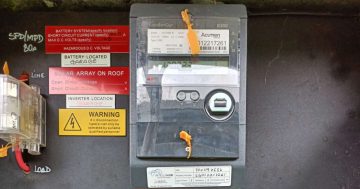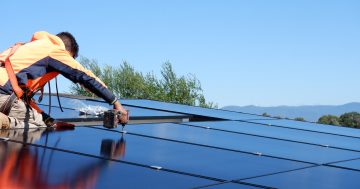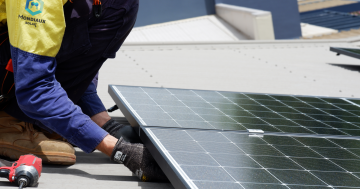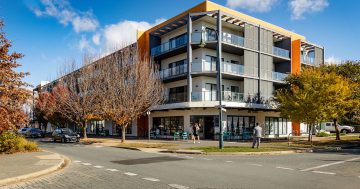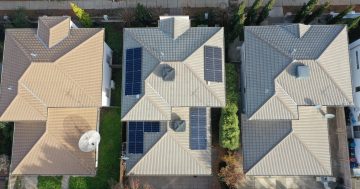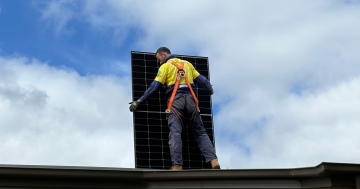
The Mondiaux Solar team at their Mitchell office. Photo: Michelle Kroll.
Between soaring energy costs and the ACT Government’s Sustainable Household Scheme in place, community groups no longer need to rely on a moral imperative to move to solar.
The fiscal incentives are clearly there, but aside from the cost and environmental benefits, Mondiaux Solar project manager Howard Lian says there is one more argument in favour of making the switch – education.
“This is perhaps particularly relevant to community groups, some of which are schools or childcare centres,” he says.
“There’s a great opportunity to demonstrate environmental responsibility and share information on how renewable energy systems can power their operations.
“For young people who want to learn, we might think of this as a chance to show them the science behind renewables, what it is, how it works and how they and the planet can benefit from it.”
From experience, Howard says installing solar power is a no-brainer from a fiscal perspective – an important consideration for community groups working with tight margins.
In one example, the installation of an 80 kW system saw a Mondiaux commercial client’s energy bills slashed from $2000 to $80 per month between the summers of 2020 and 2021.
The client also benefitted from increased solar credits, part of the Federal Government’s Renewable Energy Certificates scheme, which allows households, businesses and small organisations that install solar systems to generate credit to offset the power they draw on at night.
In this Mondiaux client’s case, the new solar system generated the additional benefit of $290.30 worth of credit in the first month after its installation. In addition, their existing system’s credits generation increased by more than $400.

For some community groups, installing solar systems may be a good conversation starter with children about the environmental benefits of renewable energy sources. Photo: Envato.
Furthermore, Howard said community groups should consider how and when they use their electricity to better understand how they might benefit, given the potential costs of exporting electricity to the grid.
“There are huge benefits for community groups, the most obvious being they can decrease their capital investment in their energy costs – money that can be diverted to fulfil other needs. That’s true of all clients, though,” he says.
“For community groups, however, there’s the added consideration that their kinds of operations tend to run during the daytime, so the customer could fully consume their solar generation.
“In this way, they’re able to make better, more efficient use of their solar systems, because their electricity is worth more for them by using it than if they export it.
“That’s because limitations regarding the export of electricity to the grid are becoming tougher. Previously we were able to fully export systems, but these days we’ve found export limits becoming more strict.
“So there are huge benefits for community groups to switch to solar, and now with the Sustainable Household Scheme they may be able to do so with much lower upfront costs.”
Part of the Territory Government’s aim to reach net zero emissions by 2045, the Sustainable Household Scheme is aimed to help households and community groups improve their energy efficiency and reduce their environmental impact.
Running now until 2026, community groups might be eligible for interest-free loans from $2000 to $15,000 for solar panels, batteries and other products, with no upfront costs or fees and up to 10 years to complete repayment.
Over the life of the scheme, community groups can install one product or a bundle of products from the list of eligible products with a combined value of up to $15,000.
A group must meet the scheme’s eligibility criteria and lending partner Brighte’s lending criteria. This includes attending a free one-hour live workshop or participating in the Business Energy and Water program online or in-person to inform you about energy efficiency choices.
Speak to Mondiaux Solar today about your solar power needs.













